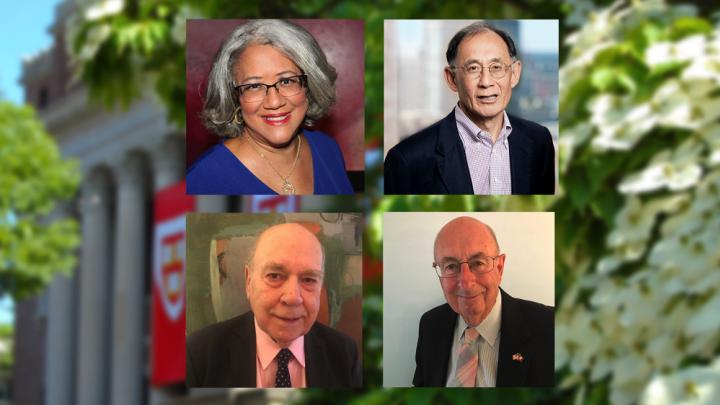The Harvard Alumni Association (HAA) today announced the recipients of the 2022 Harvard Medal, to be awarded in person during the Harvard Alumni Day celebration on June 3.
Avarita L. Hanson ’75 has been an energetic supporter of Harvard for more than four decades. In 1975 she founded what’s currently known as the Association of Black Harvard Women (ABHW), and has served as treasurer of the Harvard and Radcliffe Class of 1975, president of the Harvard Club of Georgia, Harvard Alumni Association director, and Radcliffe College Alumnae Association director. She was also a member of the Committee to Nominate Overseers and Elected Directors, and on the board of the Harvard Black Alumni Association, and was an alumni interviewer in the Atlanta region, where she continues to mentor alumni. An attorney for more than 40 years, she was executive director of the Georgia Chief Justice’s Commission on Professionalism (the first entity of its kind in the United States), which urges lawyers to improve and ensure access to the legal system. Hanson was also associate dean and associate professor at Atlanta’s John Marshall Law School, where she advised the Black Law Students Association that now bears her name.
William F. Lee ’72 has helped usher in a range of historic governance reforms and was instrumental in the University’s last two presidential searches. A member of the Harvard Corporation since 2010, he has served as its senior fellow from 2014 (he is slated to step down July 1), and served on the Board of Overseers from 2002 to 2008. As a Corporation member, Lee has chaired its committee on governance and been a leading member of its committees on appointments, facilities, and capital planning, and shareholder responsibility, as well as the governing boards’ joint committee on inspection. While an Overseer, he was vice chair of the board’s executive committee and chair of its finance, administration, and management committee. He is a past member of visiting committees for Harvard Law School (HLS) and the Harvard John A. Paulson School of Engineering and Applied Sciences, and of the board of directors of the Broad Institute of MIT and Harvard. Lee has also taught as a visiting professor and lecturer at HLS. A partner at the law firm WilmerHale, Lee is a nationally renowned trial and appellate lawyer specializing in intellectual property litigation. In addition to representing clients in many high-profile technology cases, he served as lead trial counsel for Harvard in litigation challenging aspects of Harvard College’s admissions practices.
Dwight D. Miller, Ed.M. ’71, profoundly affected generations of Harvard College students throughout more than 50 years of service in the admissions office, from which he retired as a senior admissions officer in 2019. During this period the applicant pool rose from fewer than 5,000 students in the late 1960s to 43,330 for the Class of 2023. When the former U.S. Marine platoon leader and teacher joined Harvard, he quickly became a mentor to undergraduates and an advocate for admitting the most talented students, regardless of their economic circumstances. He covered most of New England, the Atlantic seaboard, parts of the midwestern and southwestern U.S., and Canada, partnering with schools and scholarships committees in dozens of areas. Early on, he split his time between admissions and his role as senior advisor in the Freshman Dean’s Office, and served as a proctor in Grays Hall from 1967 to 1990—the longest tenure to date. He was also instrumental in creating the Hiram Hunn Award, which recognizes alumni volunteer interviewers—and which was re-named the Miller-Hunn Award in 2019 to honor his contributions.
Tom Reardon ’68 has worked devotedly to strengthen Harvard’s connections to its wide-ranging military community. In 2007 he founded the Harvard Veterans Alumni Organization (HVAO), an HAA SIG of about 2,500 people that serves as a network for veterans on and off campus, honors Harvard veterans, and bolsters the University’s relationships to student, faculty, and staff veterans. In working with the College admissions office, Reardon also introduced the Service to School (S2S) program. To date, 49 College students are veterans, and 18 more were accepted to the Class of 2026. In addition, Reardon helped raise funds for HVAO-donated plaques in Memorial Church—one for Harvard’s 18 Medal of Honor recipients and another to recognize four Army chaplains who met at Harvard and perished together on the SS Dorchester in 1943. An undergraduate during the era of anti-Vietnam War protests, he was drafted after graduation and served three years as an infantry officer, including one as a platoon leader and company executive officer, in the 23rd Infantry Division in Vietnam, receiving the Bronze Star Medal and Combat Infantryman Badge.









